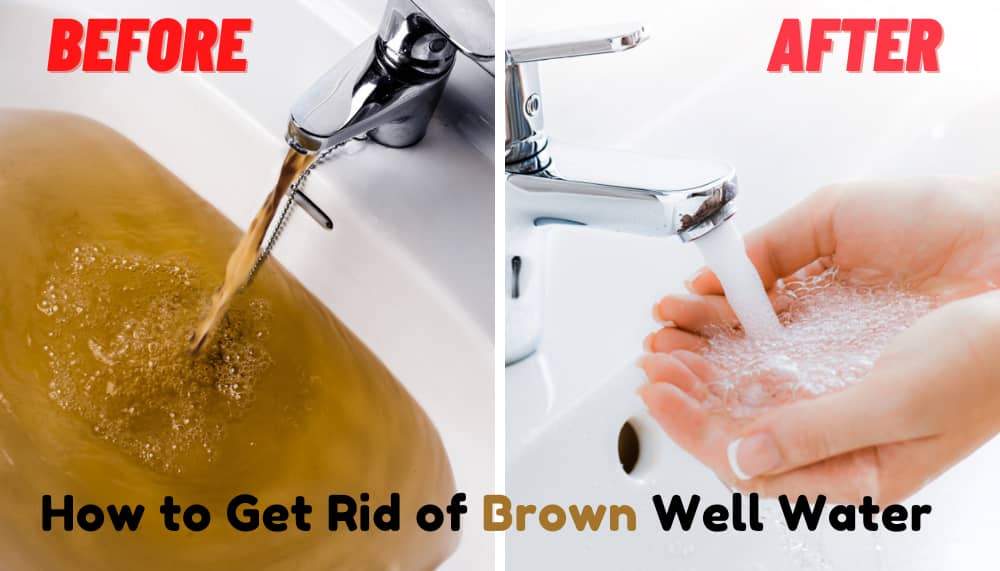Imagine you are about to start a busy day. Before that, you went to the bathroom to take a warm bath. You have just turned on the faucet. The water coming from the faucet looks like the color of tea. You’ve most likely the brown well water issue.
Now, you have no idea how to get rid of brown well water. Like many, you are wondering – why is my well water brown? What should I do?”
Having little knowledge about this is okay as it is quite rare information. Indeed, well water should be clean and pristine. When you notice nasty brown water, then it is alarming.
Brown water indicates lots of problems in your water system. Iron is the most common behind this. No matter what the reason is, you must get rid of this as soon as possible. Your water requires immediate action depending on your water system.
In the past, expensive systems with lots of maintenance were the only solution. Luckily, there are countless ways to deal with brown water. Before we tell you how to treat it the best, let’s learn about different brown well water causes. Let’s get started.
Why Is Your Well Water Brown all of a Sudden?
Dingy brown water from well most likely happens when it rains. Just then, well water turned brown, which is worrisome. Brown well water comes from the aquifer, which is the source of well water.
Aquifer works as the barricade that filters out impurities. In any case, the aquifer should be clean and contaminant free. So what are the reasons behind these contaminants in the well water? Let’s talk about brown well water causes.
Iron Ore or Iron Bacteria
In all likelihood, iron ore is the main culprit behind well water coming out brown. It is good to have an adequate amount of iron in the water. Drinking water that contains iron ore is not always harmful to humans. In fact, we all need iron in our daily diet.
However, too much iron can stain plumbing fittings. When iron-containing water comes out from the taps, you’ll get brown water everywhere. This water can make your clothes brown. It also causes the taste of water.
A standard water softener can remove the iron. But not everyone likes to drink softened water. Your water can turn brown if iron-oxide deposits and other contaminants settle to the bottom of water tanks.
Galvanized Pipes
Galvanized pipes are another significant source of brown well water. It is mostly found in older homes. When the galvanized pipes start to decline, oxidation and corrosion allow rust to peel off. The well water turned brown quickly.
If your water system is connected with the water heater, it can deteriorate water quality. Moreover, well water can also turn dark brown due to construction or hydrant use.
Tannins
Tannins are found in different species of plants. Besides, it often releases into the water while vegetation decays. Tannins give water a brownish tint and make it taste unpleasant.
Though tannins don’t lead to any health risks, it isn’t desirable in water. Tannins make the water look muddy. Also, it can stain porcelain water fixtures, laundry, etc.
How to Get Rid of Brown Well Water?
Solving water issues can be daunting – especially when it comes to well water. Most often, you cannot figure out what is going on. You can possibly see the brownish water very quickly. But it is difficult to tell what it causes.
So, the first thing you can is testing the water. According to the problem behind brown well water, you can treat the well water. You can get rid of brown water by removing the following.
1. Remove Iron Ore
If the iron ore is the main culprit, using a water softener is the first thing you can do. A water softener removes magnesium and calcium from water through ion exchange. However, water softener mostly works on hard water with an increased pH level.
For the most part, a water softener can also remove iron from well water. Some homeowners don’t want to soften their well water. For those people, an air-aspirated filter (AIV) works as a better alternative.
There are some other ways to remove iron and get rid of brown well water. They are Ion exchange, greensand, filtration, and aeration.
2. Flushing out Disturbed Sediment
If disturbed sediment causes sediment, then simply run the faucets and other fixtures for a long time. It flushes out brown water from the plumbing system. Mostly, it is needed in older homes where pipes have remained unused for an extended period. A thorough flush can remove all the sediments from well water.
3. Remove Tannins
It is very tricky to remove tannins from well water as there is no guaranteed solution. You should check at first if the tannins are the culprit. To test for tannins, you need to rake the leaves on the floor outside your home.
Wait for around a week and check if the water is still brown. If the leaves have cleared up, then tannins are the reason behind brown well water. So, you should keep raking the leaves outside your home to remove tannins.
Even after that, some tannin finds its way to the aquifer. You’ll need to invest more to remove tannins entirely. You can invest in a reverse osmosis system, Ion exchange system, or an oxidation system. In these processes, you’ll need expert help to do the plumbing.
4. Replacing Galvanized Pipes
As mentioned, hot water can also cause brown well water. If only hot water is the only reason your water heater requires immediate maintenance. Sometimes cold water minimizes this problem.
If the brown water continues to pour out of your taps, then you may need to replace the galvanized pipes. You’ll need to replace galvanized pipes with corrosion-resistant copper. At this moment, you need a trained plumber.
The plumber can only figure out the fault in your plumbing system. If galvanized pipes are not the problem, you should check for any disturbance along the main water line. It may take some time for your water quality to be like before.
5. Removing Rust
The interior of the pipes could be rusty over time. It falls into the water with the water pressure, which causes it to turn dark brown. Before you remove the rust, you need to check all your taps. Check whether water from all your taps is releasing brown water or not.
If the water turns brown in any specific tap, then rust is the reason behind this. The pipes containing water for that particular tap needs maintenance. It would help if you replaced that specific pipe releasing brown water. Ask for the plumber’s help to do this job.
However, a water heater could also be the reason for rust. If the tap releasing hot water contains brown water, your water heater is the culprit. Replace the water heater or do immediate maintenance.
Using a water softener is another effective way to remove rust. Water softener adds salt into the well water and removes rust. Also, you can combine a rust remover enhancement along with a water softener. It removes the rust gathered in the softener’s regeneration process.
6. Removing Slit
The slit can find its way to your well water and turns the muddy water brown. The slit is basically dissolved solids. It could lead to health issues and pump failures based on the sediment composition. How to understand if sediment is the reason for slit?
Take a glass of water and let it rest for a few hours. If there is any sediment, it will rest at the bottom of the glass. Usually, slit enters through the ground disturbances, which can be removed easily.
If slits sit at the bottom of the water, the reason could be that your pump is too low. The pump sucks up the sediments resting at the bottom. Here the brown well water fix is to move the pump higher.
How Long It Takes to Clear Up Brown Well Water?
It is hard to tell, as each situation is different. Usually, it takes around four to eight hours to clear up the well water. You shouldn’t use hot water until the water is clear. Thus, sediment remains out of your well water.
Verdict
Brown well water is an extreme threat to laundry and kitchen appliances. It stains everything in your household literally. That’s why it is essential to know how to get rid of brown well water. Thankfully, now you’ll get to figure out the reason behind this as well as the possible solution.
While brown water doesn’t pose any health threat, you can boil this water in the meantime. Or else, you may want to switch to bottled water until this issue is solved. Also, do not use the washing machine with the brown water problem.
Popular Posts:

Hi, I’m Julia Mitchell and through this blog I want to put forward all my experiences and expertise to help you find the best kitchen items possible. I have been working in research and development of kitchen tools for the last three decades. Throughout my professional career I have come across various kitchen products and I use that experience to assist people in getting ideal kitchen items for their requirements. If you have any further doubt, you can email us and we will get in touch with you immediately.
